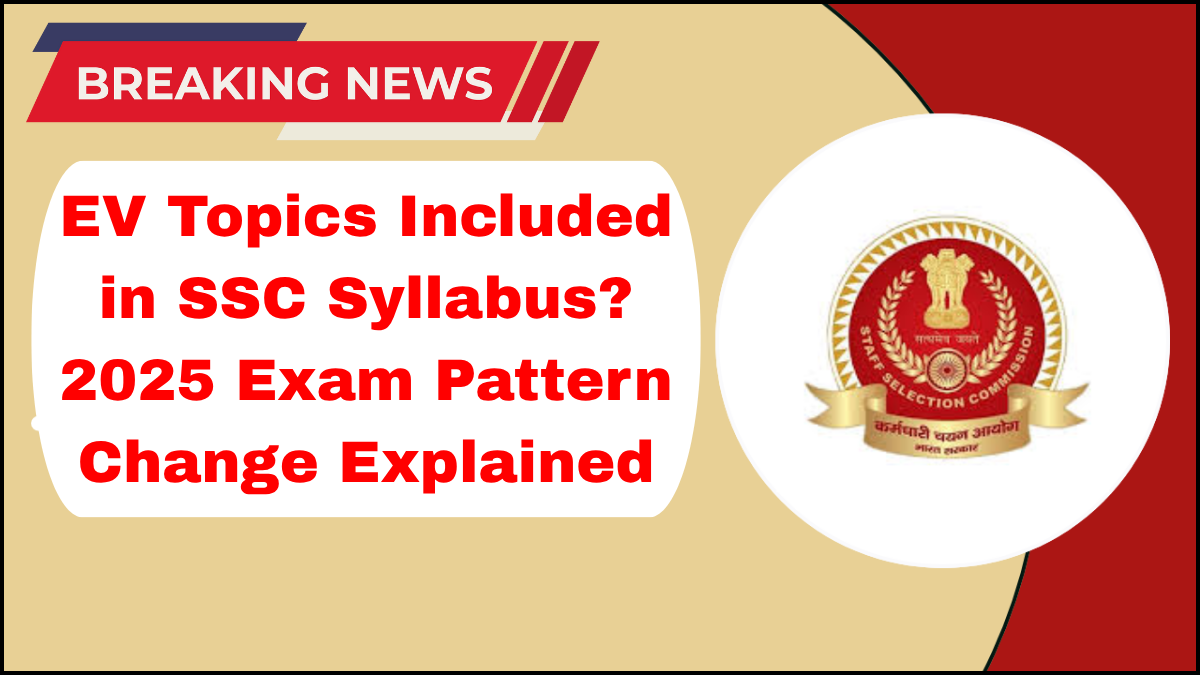The Staff Selection Commission (SSC) has rolled out significant updates to its 2025 exam syllabus. One of the most talked-about changes is the inclusion of Electric Vehicles (EV) topics in SSC syllabus—a clear move towards aligning competitive exams with evolving national priorities and global trends. If you’re preparing for SSC exams or guiding others through the process, understanding these changes is essential.

Below, we break down the latest updates, explore why EV-related content has been added, and explain what the 2025 government exam changes mean for aspirants.
What Are the Key EV Updates in SSC Syllabus?
The 2025 SSC syllabus now includes topics related to Electric Vehicles (EVs) under General Awareness and Science sections. These additions aim to enhance awareness about clean mobility solutions, sustainable technologies, and India’s role in the EV transition.
Here’s a closer look at the EV-related subjects now featured:
-
Basics of Electric Vehicles: Understanding how EVs work, major components like batteries, motors, and power electronics.
-
EV Technologies in India: Key innovations, public and private sector contributions, and startups promoting EVs.
-
Government Policies and Initiatives: Schemes such as FAME II (Faster Adoption and Manufacturing of Hybrid and Electric Vehicles) and PLI (Production Linked Incentives).
-
Environmental Impact: How EVs contribute to reducing carbon emissions and combat climate change.
-
Comparison With Conventional Vehicles: Differences in performance, cost, efficiency, and maintenance.
This shift reflects the growing importance of technological literacy in public sector roles and the government’s commitment to making sustainability part of civil services.
Why Are EV Topics Now Part of the SSC Curriculum?
The inclusion of EV updates in SSC syllabus is not arbitrary. It’s a strategic response to India’s ambitious sustainability goals. By 2030, the country aims to have a significant portion of its vehicle fleet running on electric power. This transition isn’t just about infrastructure—it’s also about awareness and administrative readiness.
SSC exams are designed to recruit future government personnel, many of whom will be responsible for implementing environmental and mobility policies. Therefore, introducing EV topics ensures that candidates understand the technologies they might be managing or promoting in their roles.
2025 Exam Pattern Change: What You Need to Know
Beyond the syllabus, the SSC 2025 exam pattern has also undergone modifications. These changes are designed to create a more balanced assessment of knowledge, application, and reasoning.
Key updates include:
-
Increased Focus on Application-Based Questions: Especially in General Awareness and Science, where EV-related topics will now appear.
-
Introduction of Case Studies: Candidates may be asked to analyze short scenarios involving EV adoption in government departments or policy implementation.
-
Updated General Science Section: More weight given to contemporary issues like renewable energy, EVs, and sustainable tech.
-
Optional Digital Literacy Component: This includes basic awareness of emerging tech trends, including AI, data, and EV ecosystems.
These government exam changes reflect a broader evolution in public service recruitment—away from rote learning and toward practical understanding.
How Should Aspirants Prepare?
To adapt to these new changes:
-
Update Your Study Material: Use the latest SSC guides that include EV-related topics.
-
Follow Government EV Portals and News: Sources like the Ministry of Heavy Industries and NITI Aayog offer valuable updates.
-
Watch Educational Videos and Webinars: Many platforms offer beginner-friendly explanations of EV concepts.
-
Practice With Mock Papers Featuring EV Questions: Build comfort with both conceptual and application-based queries.
Staying updated with EV updates in SSC syllabus is no longer optional—it’s essential for staying competitive.
Broader Implications of the EV Addition
This change signals something deeper: a redefinition of what it means to be a competent public servant in today’s world. Future government officers will need to not just enforce policy but understand emerging technologies and sustainability goals. The inclusion of EV topics is just the beginning; similar themes like green hydrogen, smart grids, and circular economy may soon follow.
FAQs
Q1: Why were EV topics added to the SSC syllabus in 2025?
A: To align the exam with India’s push toward clean mobility and sustainable technologies, and to prepare candidates for policy roles involving electric vehicles.
Q2: Which sections of the SSC exam now include EV-related questions?
A: Mainly the General Awareness and General Science sections, but application-based questions could appear in case studies or essay components (if applicable).
Q3: Will the EV topics be theoretical or practical in nature?
A: Expect a mix. Basics will cover theory, but new pattern questions may test real-world understanding or implications.
Q4: Do I need to be from a science background to answer EV questions?
A: No. The content is framed for general understanding and focuses on policy, awareness, and basic technological literacy.
Q5: Are other government exams also adopting similar changes?
A: Yes. Several government exam changes are being implemented across UPSC, State PSCs, and railways, with similar sustainability-focused content being added.
click here to learn more